Cost of Living In Turkey As An Expat – that will be the topic of today’s article.
Before introducing this article, if you are interested in our core services which are expat financial, insurance and mortgages, you can contact me here.
The best time to consider your financial situation is when you are moving to a new country.
Introduction
The cost of living in Turkey is one of the reasons a lot of expats have moved permanently to the country. Thanks to the exchange rate, foreigners have considerable purchasing power. Pair that with a high-interest savings account and the comfort of living in Turkey; it’s no wonder the nation is a household of immigrants or tourists. With an average financial literacy knowledge, many people can afford to live comfortably and within their budget.
Before we proceed, it should be noted that we have compiled this article to meet your requirements. Here, we will walk you through an in-depth explanation of the cost of living in turkey. Not only is that, but we have compiled the things to know above residing in Turkey.

Thus, let’s consider six factors that play major roles in your cost of living. It is also worth noting that these prices are not set in stone and will differ depending on your region within the country.
1. Location and Environment
If you are looking for an affordable place to pitch your tent, we suggest avoiding big cities. Contemporary cities are often expensive, as is the case with Istanbul, Ankara, and İzmir. So, for those looking to save some money, you are better off in suburban and rural areas.
Although according to Number, a system for calculating the cost of living, staying in central Istanbul is about 150% cheaper than living in London, and we’d say that is a considerable gap. If you can afford it, you should absolutely take advantage of this opportunity.
One benefit of living in Istanbul is the rent. The average cost of rent per month for a studio apartment is about 2000 TL on the outskirts of town. However, in a bigger neighborhood closer to the central location can set you back about 5000 TL. To put this in perspective, you can find a 1 bedroom on sale for about $45,000.
Compare this to Aegean and Mediterranean coasts, where an apartment can cost between 900TL to 1000 TL, depending on certain factors like the age of the building, condition, and neighborhood. All prices are in the Turkish Lira (TL), and expats should convert to their local currency using current exchange rates, but as of writing this article, 1000TL is $105.
On the Aegean and Mediterranean coasts, renting an apartment starts at roughly 900TL, depending on condition, age, and upkeep. For living costs and expenses, the examples used below focus on Altinkum, which offers reasonable prices. All quotes are in Turkish lira (TL), and foreigners should convert to their currency utilizing the day’s exchange rate.
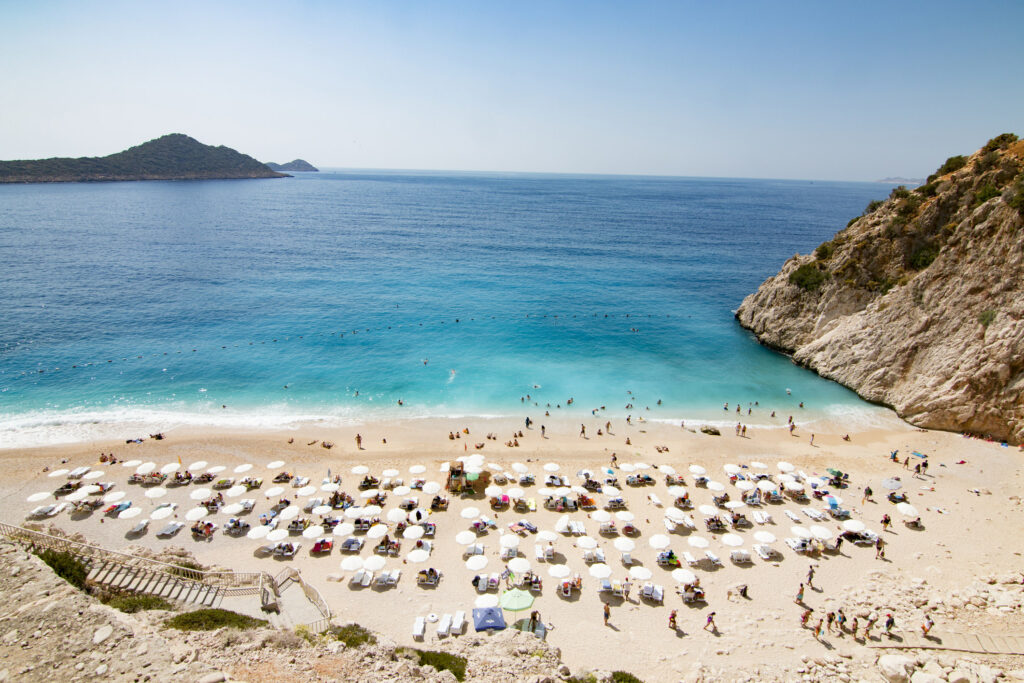
2. Goods, Services and Home Costs
As stated before, you can rent a furnished apartment for about 900 TL. For those who decide to purchase property in Turkey, you will need to consider maintenance costs, taxes, maintain a good standard of living and feed well. Some things to factor include:
- Council and Rubbish Tax: According to Turkish law, the number of people on a title deed has to make a yearly payment. The average tax for a two-bedroom is about 200 TL/year.
- Insurance: Due to Turkey being an earthquake region, homeowners must pay Earthquake insurance. The amount paid is based on the square meters in question. For example, a one-bedroom flat can cost about 275 TL/year; this does not include fire, theft, and damages.
3. Utilities
One other thing to consider is household utilities like gas, electricity, and water. Gas is sold in bottles in small shops across cities for about 120T, and this is enough to last a single person for more than a year. Additionally, you do not have to worry about television bills. This allows you to focus on other bills like water, telephone, and internet.
- Electricity Bills: Turkey’s electricity is run by private companies, with each company in charge of different regions. Therefore, electric bills may differ, and spending time at home will consume a lot more electricity and shoot the bill higher. The average electric bill in a quiet neighborhood on the outskirts should be about 250 TL/month.
- Water: Many residents make use of prepaid water meters, and others prefer the monthly bill system. Shockingly, in Turkey, your average bill a year could be about 200 TL.
- Internet and Telephone: Turkey has several network providers, but the nation’s favorite is Telecom. They provide internet, phone services, and TV satellites in various packages. Unlimited monthly packages can cost you about 90TL, while phone calls abroad go for about 50 TL.
4. Food and Groceries

One of the biggest supermarkets and a customer favorite because of their reputation for low prices and affordable food is Bim. There are two other supermarkets Migros and Carrefour, whichever you find closest to you is a good choice to cut down on grocery shopping costs.
Alternatively, you could also go the route of the local farmers market, where you can get fruit, cheeses, and vegetables at much lower prices and far greater quality than in supermarkets.
For our meat lovers, you might be disappointed to know that beef and lamb are quite on the costly side, and you should probably go for the chicken. A kilogram of lamb can cost as much as 150 TL compared to 12 TL for a kilo of chicken. It’s no wonder chicken is the main ingredient of many recipes and a staple in many Turkish households. A milk bottle will cost about 4 TL, and half a crate of eggs will set you back 15 TL.
For those who love dining out or want to explore Turkish cuisine, expect to spend 70TL on steaks and 40TL on pasta meals. Turkey has a wide range of foods and even accommodates foods from other cultures. You can find an old-fashioned English breakfast for 25TL.
If you love to spend time on the beach, be prepared to spend more money on food at the beach. It is because the rent on the beach is higher, so they charge more to make money. You can save money by eating at home or in places away from the beachfront.
There’s no such thing as cheap alcohol anymore. In places like Altinkum, you can get a beer for 20 TL, whereas in Istanbul, double or even triple that price. A glass of fine wine will set you back 25 TL, and that’s in a town like Altinkum, while spirits are about 30 TL.
5. Driving
Petroleum is quite expensive, so if you can stick to public transport and local busses instead of driving, then you should be good. Large cities also offer Metro services, and they are relatively inexpensive.
6. Healthcare and Permanent Residency
For residency applicants, fees differ depending on nationality. However, the average cost is 80 USD for first-time applications. For countries that don’t require e-visas, you will need to pay 658in taxes plus 110TL for your documents. Permits have one year before they need to be renewed; your next renewal, however, will cost 60 USD and not 80.
Health insurance is compulsory for anyone under the age of 65. The cost of the insurance varies depending on your medical health plan and what it covers. Although many expats sign up for the monthly state SGK health coverage, so look into that if it interests you.
How much money do I need to live comfortably in Turkey?
The answer to this question depends on a lot of factors, such as where you want to live, are you renting or do you own property in the country, will you be staying alone or are you supporting a family, and finally, what is your definition of living comfortably?
If you decide to stay in Istanbul, be prepared to cough up the dough because it is an expensive place to live. You will need a minimum of 10,000 TL/month to live comfortably, and that is if you own property and don’t have to pay rent. Nevertheless, move to a cheaper place in Turkey, and the cost of living drops considerably. Instead of 10,000 TL, you’ll be fine with 7,000 a month.
When choosing a place to live in Turkey and deciding your budget, certain factors make all the difference. Check them out below.
1. Exchange Rate
If your income is paid in a foreign currency, you will need to factor in the exchange rate. It is essential because the exchange rate is high, and although the Turkish government is hard at work to lower it, we will probably not see much change in the next couple of years, according to experts. Unfortunately, the exchange rate of the Turkish lira goes up and down like a swing set every week, so remember this fluctuation when creating your budget.
2. Rent Vs. Owning property
Many people who move to Turkey to retire end up owning or buying property. This eases the stress of constantly having to deal with changes in rent rates. They often vary from place to place, but one thing is for sure, they rise every year. Rent rates can range from 2000 to 6000 TL in sub-urban areas. Therefore, it is vital to research extensively and plan your budget if you intend to rent and not buy property in Turkey.
3. High-Interest Savings Accounts
This is a major plus for you as an Expat, and we suggest you take hold of this opportunity. Many foreigners put large sums of money into such accounts and receive up to 19% back. After a month, they withdraw, pay taxes and boost their income. However, we remind you that the Turkish government is on a mission to reduce the interest rates. So, keep it in mind when drafting your budget.
Where do most expats live in Turkey?
In recent times, retiring abroad has become the trend, and a lot of people turn an eye to Turkey as one of the places they can call a second home, permanently or temporarily. But as with human beings, there’s always the urge to stay close to home, so we gravitate towards people of the same tribe and nationalities.
Expat travel destinations is often influenced by the nationalities that live there and are nothing like the villages you’ll find featured on the guide books. Sure, people visit those places, but nobody has ever moved their family to live on a farm in the mountains from a different country or retired on a beaten track in the mountains. They prefer to take advantage of the relationships they will build with other expats and get advice on settling in the country.
There are several regions where expats settle in Turkey; a lot of them are on the coasts of the Mediterranean Sea and the Aegean coast. Not a lot of expats live in East Turkey because it’s more conservative than West Turkey. Working Expats often live in big cities like Ankara but Istanbul. However, retirees and those who can pay for it live on the coastlines, which are some of the most comfortable expat communities.
Below are some regions where you can find expat communities.
● The Bodrum Region
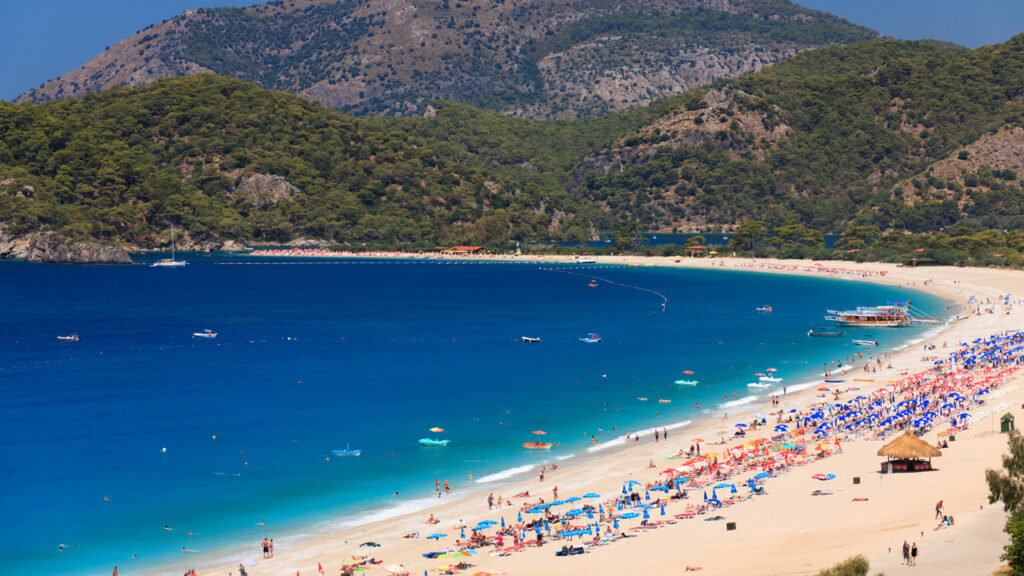
The Bodrum peninsula is set on the west coast, not too far from the Island of Los, Greece. Statistics have shown that it is one of the biggest holiday destinations in Turkey; expats have been flocking there since the 1950s, although it didn’t become a hotspot until the turn of the century when it became legal for foreigners to own property.
Move to the town center and explore the beautiful scenic waterside that attracts sailors and nautical enthusiasts because of the Turkish Rivera’s reputation in gulet boat cruising. Other than that location, expats love the resort in Yalikavak. It is because, in the last year, it has risen to a place of fame and prestige because of the multi billionaire Palmarina welcoming mega yachts.
● Kusadasi: An all Year-round Destination

The Irish folk, on the other hand, prefer the Kusadasi as their getaway location. Still, since the expat influx at the turn of the century, more and more nationalities have settled and even bought properties there. One of Kusadasi’s major pluses is that it is an all-year location open all year to everyone; pair that with cruise ships from all over Turkey, and you have an influx of more expats. Over the years, this place has transformed from a village to a hotspot town on its way to becoming a city.
● Altinkum: Little Britain
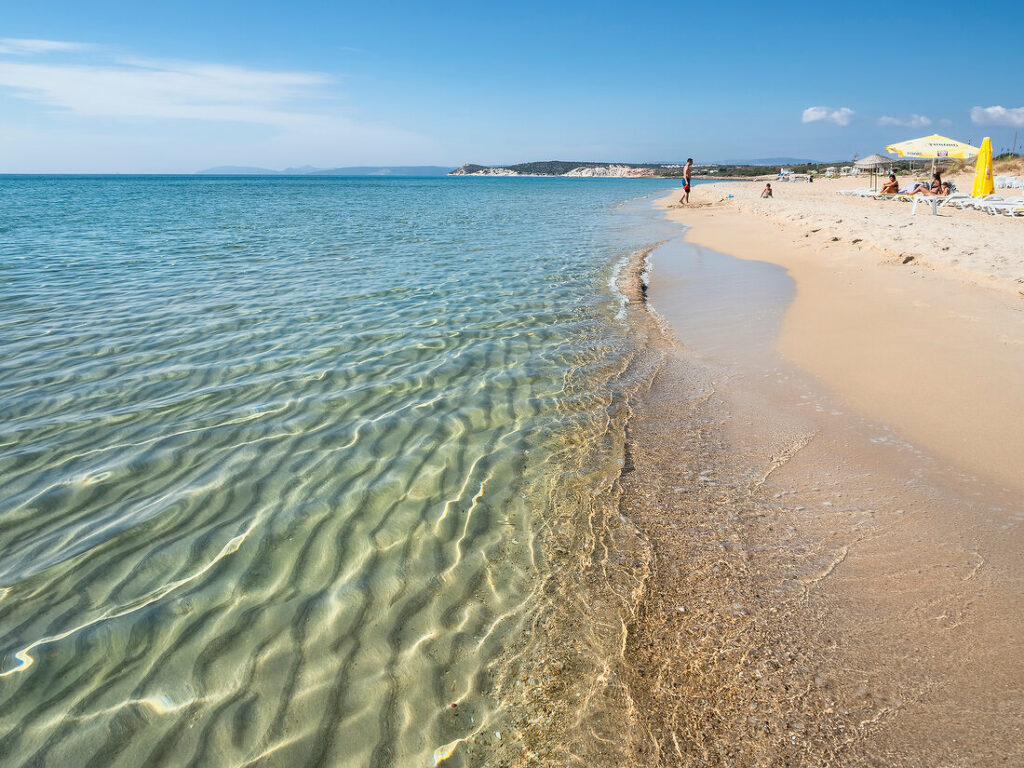
Altinkum is also called “Little Britain” because of the size of the British Expat population in the area. They live there all year round, and the area is one of the cheapest locations in Turkey for foreigners, so if you are on a budget and looking to lower your cost of living, we recommend Little Britain.
Beautiful bars and restaurants influenced and highlighted by British culture advertise food and entertainment, welcoming everyone to participate and enjoy. Although, in Didim, an old traditional Turkish town, Turkish culture and cuisine are on full display. Offering expats the best of both worlds, letting them enjoy the beauty of Turkey but allowing them to enjoy the warm feeling of home.
● The Antalya Region
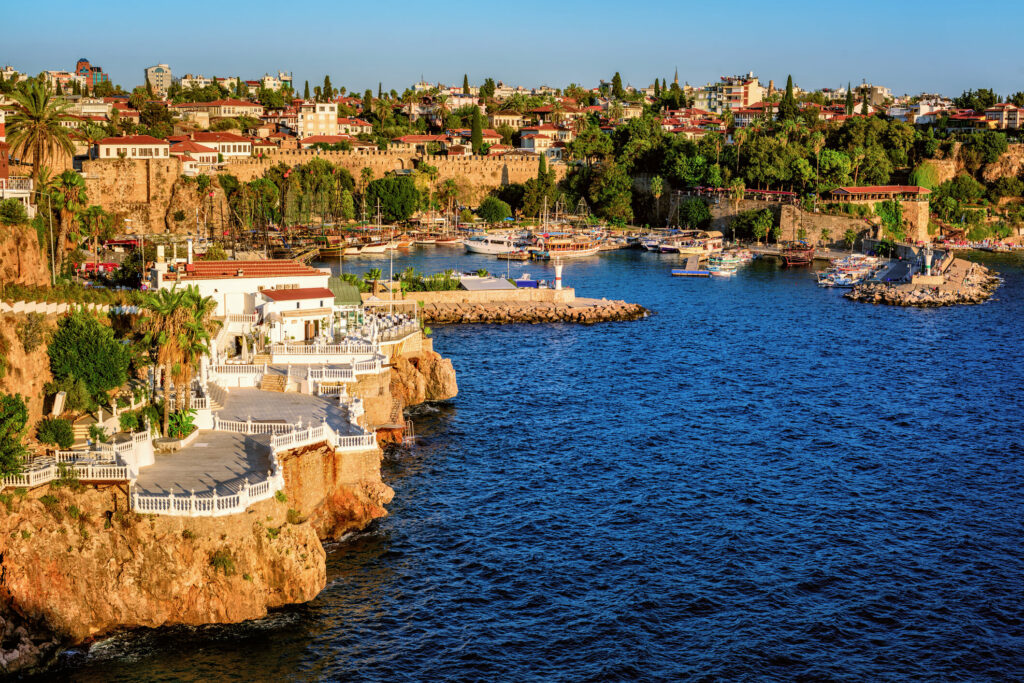
Antalya, located on the eastern tip of the Mediterranean coast, has a more European feel than any destination on this list. Unlike Altinkum that attracts just British Expats and a few others, Antalya attracts Russians, Germans, French, and other East European countries.
Antalya is quite popular among tourists and takes second place with the most properties sold to foreigners. Expats have made their tent and settled in many coastal resorts in the area.
● Istanbul: Turkey’s largest city.
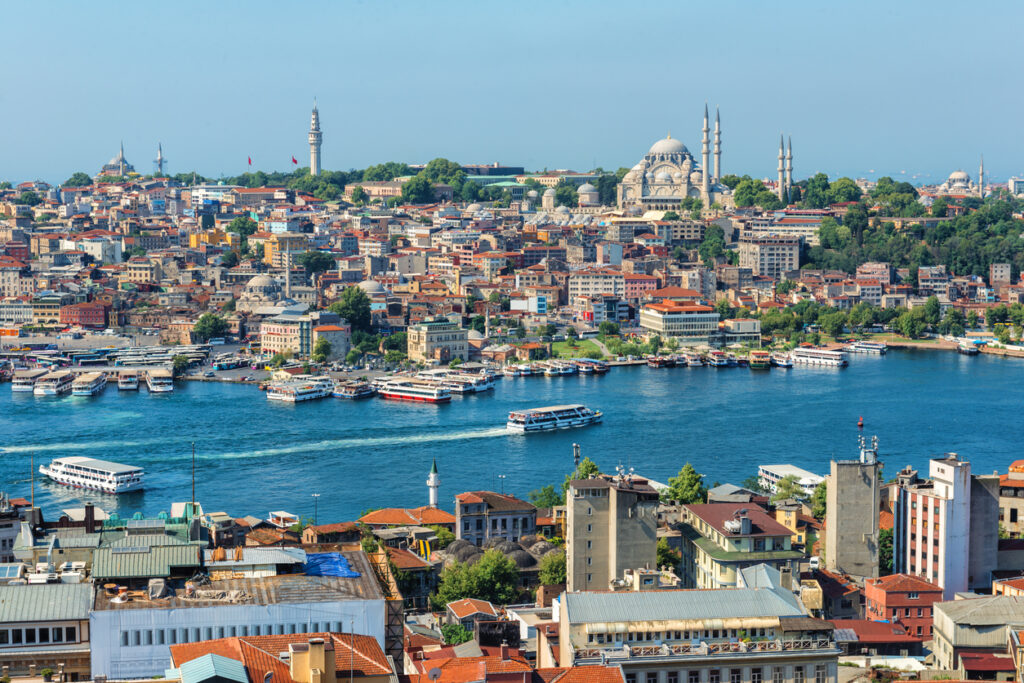
As we stated above, Istanbul is famed for attracting working expats, although, over the years, retirees have begun to settle on the outskirts of the city as well. According to recent reports, the city is planning many new developments in its infrastructure, including a bigger airport to increase its travel capacity. This news has attracted the attention of many investors hoping to get their own slice of the cake.
Expats considering a move to Turkey will naturally have many concerns about life in this culturally rich country. From their safety and security to healthcare and schooling concerns, here are answers to some of the most frequently asked questions about expat life in Turkey.
Frequently Asked Questions about Turkey
For expats who plan to move to Turkey, there are bound to be several concerns about life in Turkey. Several questions about safety, security, healthcare, and schooling. We can’t answer all of those questions in this guide, but we can answer some of the frequently asked questions about expat living in Turkey.
Is Turkey safe for expat?

This is usually the first question on any intending expats mind. We’d say yes, and Turkey is generally a safe place to live for expats, although they have been several issues with terrorism that have raised an eyebrow or two.
There have been attacks by regional and local terrorist groups in some places in the county. However, the attacks have drastically reduced since the government has begun to crack down on these groups and set up operations to prevent these groups from causing harm.
Government authorities act decisively to stamp such attacks, and the protection of foreign residents and tourists is viewed as the first priority. Expats in Turkey are advised to stay updated on local issues and always take steps to ensure their safety when moving around.
Does Turkey have international schools?
There are several international schools in the country. However, a lot of them are based in Ankara or Istanbul. Some of these schools use the foreign curriculum, the likes of International Baccalaureate, American and British.
Turkey boasts of good British, German, and French schools. However, school tuition fees are quite expensive due to the demand. There is limited space, and parents have to plan ahead to save a spot.
Even though expat children are allowed to school in Turkish Public schools, it seems expat parents prefer their children attend international schools. For expats with young children who intend on staying in Turkey for a long time, we advise you to send them to local schools. Your children can make more friends, learn the language and the culture while getting an education.
Does Turkey offer good healthcare facilities?
The country offers both private and public healthcare facilities. However, healthcare quality varies, but doctors are adequately trained, and the hospitals get the job. Turkey has bagged a reputation as a medical tourism destination, especially in cosmetic surgery, fertility treatment, and dentistry.
This could be attributed to the fact that healthcare services in Turkey are inexpensive compared to other parts of Europe. There’s an overflow of pharmacies in towns, suburban areas, and cities. So, as an Expat, you shouldn’t struggle to find a lot of medications.
Is it hard to import my car into Turkey?
If you decide to move to Turkey, you will need to consider if it’s worth it to have your car imported. The process is complex, exhausting, and quite expensive. Expats need to submit several documents, which may take months to process, and then wait for Alien Vehicles. Temporary entrance to Carnet to import the car. All of these areas are opposed to buying a new car.
Is it hard to get a work permit in Turkey?
Yes. It is unfortunate, and the process can be quite difficult because there are several restrictions and laws for what jobs a foreigner can apply for, and even with that, the employer has to prove that no local/citizen has the skills they are looking for. We highly recommend you get the job, apply for a work permit, and before you arrive in Turkey.
The application process involves a lot of paperwork and helps from your employer to work out. Expats will have to send a request to the nearest Turkish embassy; then, the employer applies to the Turkish Ministry of Labour and Social security. Both proposals must be submitted ten days from one another no later and can take at least 30 days before you get a response.
Conclusion
The Cost of living in Turkey depends on several factors, as we have stated in this article. For a single man looking for work in the outskirts of Istanbul, it will vary when compared to a family of four living on the coastline. We advise you to plan your budget accordingly, and we hope this guide aids your decision.


